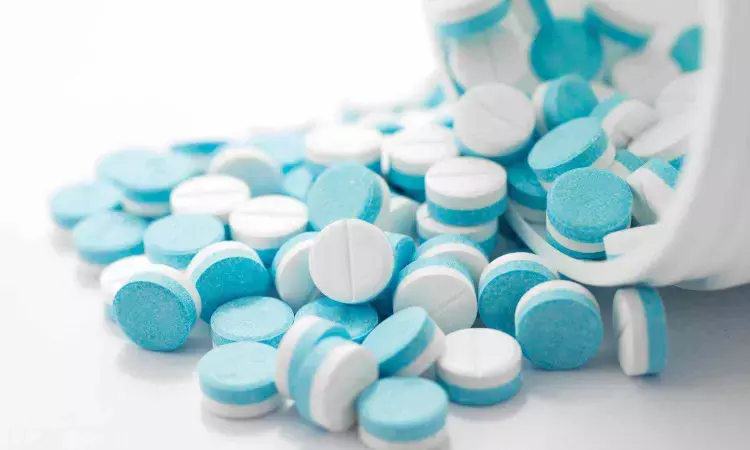- Home
- Medical news & Guidelines
- Anesthesiology
- Cardiology and CTVS
- Critical Care
- Dentistry
- Dermatology
- Diabetes and Endocrinology
- ENT
- Gastroenterology
- Medicine
- Nephrology
- Neurology
- Obstretics-Gynaecology
- Oncology
- Ophthalmology
- Orthopaedics
- Pediatrics-Neonatology
- Psychiatry
- Pulmonology
- Radiology
- Surgery
- Urology
- Laboratory Medicine
- Diet
- Nursing
- Paramedical
- Physiotherapy
- Health news
- Fact Check
- Bone Health Fact Check
- Brain Health Fact Check
- Cancer Related Fact Check
- Child Care Fact Check
- Dental and oral health fact check
- Diabetes and metabolic health fact check
- Diet and Nutrition Fact Check
- Eye and ENT Care Fact Check
- Fitness fact check
- Gut health fact check
- Heart health fact check
- Kidney health fact check
- Medical education fact check
- Men's health fact check
- Respiratory fact check
- Skin and hair care fact check
- Vaccine and Immunization fact check
- Women's health fact check
- AYUSH
- State News
- Andaman and Nicobar Islands
- Andhra Pradesh
- Arunachal Pradesh
- Assam
- Bihar
- Chandigarh
- Chattisgarh
- Dadra and Nagar Haveli
- Daman and Diu
- Delhi
- Goa
- Gujarat
- Haryana
- Himachal Pradesh
- Jammu & Kashmir
- Jharkhand
- Karnataka
- Kerala
- Ladakh
- Lakshadweep
- Madhya Pradesh
- Maharashtra
- Manipur
- Meghalaya
- Mizoram
- Nagaland
- Odisha
- Puducherry
- Punjab
- Rajasthan
- Sikkim
- Tamil Nadu
- Telangana
- Tripura
- Uttar Pradesh
- Uttrakhand
- West Bengal
- Medical Education
- Industry
EMA recommends suspension of medicines containing 17-hydroxyprogesterone caproate amid possible cancer risk

In a recent development, the European Medicines Agency's safety committee, PRAC, has recommended the suspension of the marketing authorizations for medicines containing 17-hydroxyprogesterone caproate (17-OHPC) across the European Union (EU). This recommendation follows a comprehensive review conducted by PRAC, revealing a potential yet unconfirmed risk of cancer in individuals exposed to 17-OHPC in utero.
In some EU countries, 17-OHPC medicines are authorised as injections to prevent pregnancy loss or premature birth in pregnant women. They are also authorised for the treatment of various gynaecological and fertility disorders, including disorders caused by a lack of a hormone called progesterone.
The PRAC reviewed the results from a large population-based study, which looked at the risk of cancer in people who had been exposed to 17-OHPC in the womb, over a period of about 50 years from the time they were born. Data from this study suggest that these people might have an increased risk of cancer compared with those who were not exposed to the medicines. However, the PRAC noted that there was a low number of cancer cases in the study and that the study had some limitations, such as limited information on risk factors for cancer. The Committee therefore concluded that the risk of cancer in people exposed to 17-OHPC in the womb is possible, but cannot be confirmed due to uncertainties.
In its review, the PRAC also considered data on the effectiveness of 17-OHPC medicines in their authorised uses, including the results from a study looking at how well they prevented premature birth. The study, which involved over 1,700 pregnant women with a history of preterm delivery, found that 17-OHPC is no more effective than placebo (a dummy treatment) in preventing recurrent premature birth or medical complications due to prematurity in newborns. The Committee also reviewed two published meta-analyses (combined analyses of multiple studies), which confirmed that 17-OHPC is not effective at preventing preterm birth. For the other authorised uses of 17-OHPC, the PRAC concluded that there is limited evidence of effectiveness. During the review, input was also sought from experts in obstetrics, gynaecology and fertility treatment, and from patient representatives.
"In terms of efficacy, data from a multicentre, double-blind randomised controlled trial have shown a lack of efficacy of 17-OHPC in the prevention of preterm birth; there are limited data on efficacy in other obstetric, gynaecological and fertility indications authorised in the EU," the release stated.
In view of the concern raised by the possible risk of cancer in people exposed to 17-OHPC in the womb, together with the data on the effectiveness of 17-OHPC in its authorised uses, the PRAC considered that the benefits of 17-OHPC do not outweigh its risks in any authorised use. The Committee is therefore recommending the suspension of the marketing authorisations for these medicines. Alternative treatment options are available.
"Healthcare professionals should no longer prescribe or dispense 17-OHPC medicines and should consider appropriate alternatives for any indication. Other treatment options are available. If you are using a medicine containing 17-OHPC, your doctor will discuss switching to a suitable alternative with you. The outcome of this review does not affect the use of progesterone, which works in a different way to 17-OHPC," the release added.
Ruchika Sharma joined Medical Dialogue as an Correspondent for the Business Section in 2019. She covers all the updates in the Pharmaceutical field, Policy, Insurance, Business Healthcare, Medical News, Health News, Pharma News, Healthcare and Investment. She has completed her B.Com from Delhi University and then pursued postgraduation in M.Com. She can be contacted at editorial@medicaldialogues.in Contact no. 011-43720751
Dr Kamal Kant Kohli-MBBS, DTCD- a chest specialist with more than 30 years of practice and a flair for writing clinical articles, Dr Kamal Kant Kohli joined Medical Dialogues as a Chief Editor of Medical News. Besides writing articles, as an editor, he proofreads and verifies all the medical content published on Medical Dialogues including those coming from journals, studies,medical conferences,guidelines etc. Email: drkohli@medicaldialogues.in. Contact no. 011-43720751


